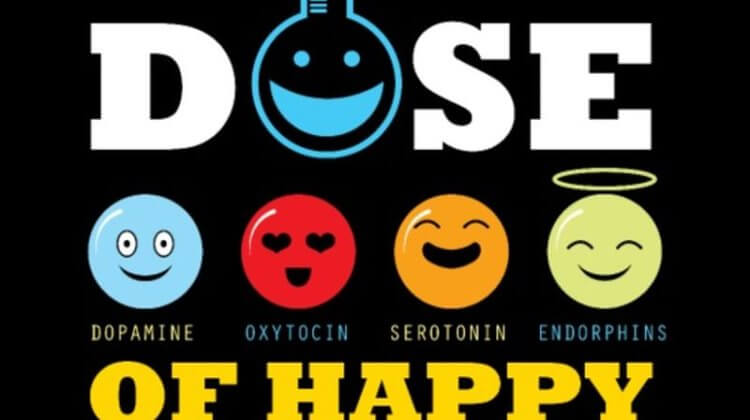
*Note: This “In Retrospect….” interlude is a relevant interjection containing thought provoking retrospective analysis on the science of human behavior, psychology, and politics. If this chapter adversely disengages the reader from the flow of the story, it can be skipped or read later.
Everyone has it in them to be an alpha, or a beta. Everyone has it in them to be a leader, or a follower. Everyone has it in them to be happy, or depressed.
D.O.S.E. (Dopamine, Oxytocin, Serotonin, Endorphins) are monoamine, or opiate protein, neurotransmitters produced by the brain that double as reward stimuli. Every time a human does something that ensures the survival of oneself, or the survival of its species, our brains produce these neurotransmitters as a reward mechanism. Humans are supposed to crave, be incentivized by, or be addicted to, the actions that elicited the production of D.O.S.E. Being addicted to performing the actions that ensure our survival results in the proliferation of our species. The D.O.S.E response determines our mood, and dramatically influences human behavior. What is not fully understood by most people, is just how massively pervasive these neurotransmitters are in understanding, and controlling, human behavior. Some actions that elicit a D.O.S.E. response are: eating, sex, exercise, human connection, and helping people.
When humans perform an action to help another human, and they are shown respect, admiration, and appreciation for their help; the benefactor produces a D.O.S.E. response as a reward stimulus. Humans are more likely to survive when we help each other, which is what caused humans to evolve this mechanism. Dopamine causes the brain to store information as to what caused the D.O.S.E. reward response. Additionally, dopamine narrows focus, creating ambition and motivation to repeat the action to elicit another D.O.S.E. response. Humans are supposed to crave and become addicted to performing the actions that help the survival of our species.
Because helping people elicits a D.O.S.E. response, dopamine subsequently causes benefactors to crave, or want, to help again in a similar manner. When a benefactor is repeatedly helpful, to a multitude of people, in a multitude of ways, the resulting respect, admiration, and appreciation cause people to look to the benefactor as a leader. The dopamine produced from the display of respect, admiration, and appreciation gives a leader the impetus to help more – and an Alpha is borne.
Mammals have been evolving these mechanisms for a hundred million years. Complex modern societies have only existed for the last few hundred years. So, it is easier to understand the mechanisms behind the D.O.S.E. response when we think in terms of ancient cultures or simple societies. Our traditional sense of an alpha male is associated with an ancient tribe of humans, a tribe of chimpanzees, or a pack of dogs. In these unsophisticated societies, the most helpful member of a tribe or pack is generally the largest and most physical member. In these simplistic societies, the largest and most physical member is usually the most helpful in terms of procuring food and protecting the tribe or pack. In complex contemporary societies that are not predicated on physical ability, members of society have to creatively leverage their assets to be benefactors and create value for themselves.
When I utilized my education, and vast empirical evidence, to procure, inform and coach people on the most efficacious use of testosterone and its derivatives; my customers displayed respect, admiration, and appreciation. Their deference and loyalty caused a dopamine response that motivated me to learn more to produce better products and services. The dopamine mechanism turned me into a leader in my industry with some of the vastest knowledge in the world when thinking in terms of empirical evidence and information gained by coaching tens of thousands of people through the use of my products. What can we learn from this? If you want respect, admiration, and appreciation; if you want to be a leader, then leverage your assets to learn how to help as many people as possible in the most meaningful way.
In popular culture and media, dopamine is often portrayed as the main chemical of pleasure, but the current opinion in pharmacology is that dopamine instead confers motivational salience. In other words, dopamine signals the perceived motivational prominence (i.e., the desirability or aversiveness) of an outcome, which in turn propels behavior toward or away from achieving that outcome. When I contemplated the respect, admiration, and appreciation people showed me for my superior products and service, and when I contemplated the vast amount of money I was making; it was the thought of NOT having those rewards (loss aversion), combined with the aversiveness to being pathetic and poor, that conferred dopamine to direct motivational salience, causing me to narrow my focus, regain my composure, and create an action plan to keep my money and army of loyal customers.
In terms of succinctly defining what this D.O.S.E. response does for us – it makes us happy. We have words that we use for a D.O.S.E. response. These words include: happiness, joy, content, love, passion, motivation, ambition, drive, and myriad other words that denote our mood.
Our brains have regulating mechanisms to keep the D.O.S.E. response at an optimal level. Below is one possible example of the graph of a D.O.S.E. response over time, and the corresponding mood:

When humans perform enough actions that produce a D.O.S.E. response, they are happy. When humans fail to perform enough actions that produce a D.O.S.E. response, they can become depressed.
What can we learn from this? If our happiness is a function of frequency and degree of D.O.S.E. responses, then, in order to be happy, we have to do the things that humans evolved to naturally produce a D.O.S.E. response. However, there is a caveat to this. If we focus too much on one source for the D.O.S.E. mechanism, such as eating, sex, or drugs; it can become a negative addiction. The key is to implement a diverse portfolio of D.O.S.E. responses. Helping people creates an exponential D.O.S.E. producing cycle, because it reinforces human connection, respect, admiration, appreciation, and love – all D.O.S.E. generating actions. Helping people is by far the most effective D.O.S.E. mechanism. Therefore, to increase our level of happiness, leverage your assets and learn how to help as many people as possible in the most meaningful way.
As we have discussed, when someone is in a position to create immense value for a prodigious expanse of people, they can produce an excessive D.O.S.E. response. Excessive amounts of D.O.S.E., especially when combined with drugs or alcohol, can cause mania. Mania is manifested by making people feel God-like, megalomaniacal, impulsive, and overly self-righteous. It can portend embarrassing outbursts, anger, and absurd behavior. As was mentioned, Charlie Sheen’s behavior when he was “winning”, is an example of mania. Another popular example is Shia Labeouf. In 2014, Shia Labeouf was formally charged with two counts of disorderly conduct and one count of criminal trespassing when he reportedly stood up in the middle of the Broadway “Cabaret” performance to yell at the actors onstage with a cigarette in his mouth. In 2006, Mel Gibson went on a drunken antisemitic diatribe that was clearly the result of a manic episode. Uday Hussein held wholesale power over those around him due to his status as Saddam Hussein’s son. Uday was reportedly erratically ruthless and intimidating to perceived adversaries as well as to close friends. Family relatives and personal acquaintances were often victims of his violence and rage. Witness allegations have suggested he was guilty of rape, murder, and torture, including the arrest and torture of Iraqi Olympic athletes and members of the national football team whenever they lost a match. Our characterization of a ruthless dictator defines what can become of unfettered mania, hence the saying; absolute power corrupts absolutely.
Many people are able to deal with mania with aplomb. People who are often put in positions to become manic, such as actors or big-name politicians, have publicists or coaches to help bring them back to reality and deal with manic mentations. I didn’t have anyone to coach me.
I had thousands upon thousand of adulators online, and a growing retinue locally of people who wanted to be a part of an entourage with a guy who suddenly had a superfluous amount of money. Justin Bieber asked a profound rhetorical question regarding his erratic behavior; What do you get when you give a teenager 200 million dollars and seemingly unlimited fame? It will be interesting to see how I handle the vicissitudes of expanding power and exponentially accumulating wealth.
NEXT >> Episode 18 (Scaling an Infrastructure)
Memoirs of a Steroid Kingpin (Table of Contents)
Start reading from the beginning or browse the table of contents for summaries of each episode of “Memoirs of a Steroid Kingpin”.
Ryan’s Root’s real-life autobiographical story is a must-read account of his rise and fall as one of the largest anabolic steroid dealers on the Internet.
Don’t Miss the Next Installment
Register and subscribe to receive instant notifications of each new installment of “Memoirs of a Steroid Kingpin”.
“Memoirs of a Steroid Kingpin” is published online for the very first time in a serialized format exclusively for MESO-Rx readers. We plan on publishing 3 to 4 new episodes every week.Stay tuned and enjoy the ride!


Leave a Reply
You must be logged in to post a comment.